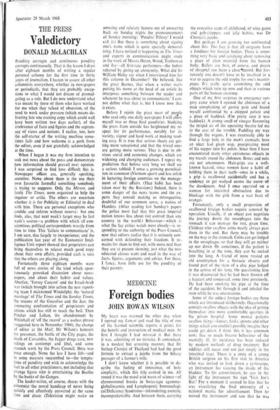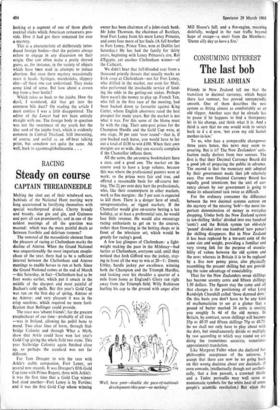Foreign bodies
MEDICINE JOHN ROWAN WILSON
My heart was warmed the other day when I opened my Lancet and read the title of one of the learned scientific reports it prints for the benefit and instruction of medical men. At first I thought I had misread it. But there it was, admitting of no mistake. It announced, in a modest but arresting manner, that Dr Suthep Choojai of Thailand had had the good fortune to extract a jujube from the biliary passages of a farmer's wife.
I don't know whether it is possible to de- scribe the feeling of innocence, of holy simplicity, which this title evoked in me. All round it was the usual arid waste of science—of chromosomal breaks in Swiss-type agamma- globulinaemia and Lymphopenic Immunologi- cal Deficiency Syndrome—intimidating, esoteric, incomprehensible. And between them, carrying the evocative scent of childhood, of wine gums and gob-stoppers and jelly babies, was Dr Choojai's jujube.
But perhaps I am growing too sentimenta about this. The fact is that all surgeons have a fondness for foreim bodies. There is some- thing very basic and satisfying about removing a piece of alien material from the human body. Bullets are best, of course, and pieces of shrapnel run them a closetecond. Mit for- tunately one doesn't have to be involved in a war to acquire the odd trophy for one's mantel- piece. It's really quite astonishing the odd objects which turn up now and then in various parts of the human anatomy.
One of my first surprises in emergency sur- gery came when I opened the abdomen of a man complaining of gastric pain and found myself confronted by a chipped potato and a piece of haddock (I'm pretty sure it was haddock). A strong smell of vinegar flavouring the insipid air of the operating theatre led me to the seat of the trouble. Paddling my way through the organs, I was eventually able to find a large hole in the man's stomach; here an ulcer had given way, precipitating most of his supper into his pelvis. Since then I have encountered many other extraneous objects in my travels round the abdomen. Bones and nuts are not uncommon. Hair-grips are a well- known hazard, since women have a habit of holding them in their teeth—once in a while, a grip is swallowed accidentally and has a tendency to get wedged across the curve-of • the duodenum. And I once operated on a woman for intestinal obstruction due to blockage with the pith from a vast feast of oranges.
Fortunately, only a small proportion of swallowed foreign bodies require removal by operation. Usually, if an object can negotiate the journey down the oesophagus into the stomach it can manage the rest, given time. Children who swallow coins nearly always pass them in the end. But there may be trouble on the way to the stomach. Coins can get lodged in the oesophagus so that they will go neither up nor down. Or sometimes, if the patient is breathing in at the time, they can be sucked into the lung. A friend of mine treated an old countryman for a thoracic abscess and found part of the stem of a clay pipe lodged in the centre of his lung. On questioning him it was discovered that he had been thrown off a haycart and concussed, some time previously. He had been smoking his pipe at the time of the accident, bit through it and inhaled the stem while he was unconscious.
Some of the oddest foreign bodies are those which are introduced deliberately. Occasionally convicts swallow objects with the idea of getting themselves into more comfortable quarters in the prison hospital. Some mental patients swallow things—knives, forks, spoons and other things which you couldn't possibly imagine they could get ..down. I think this is less common now; like so much bizarre behaviour of the mentally ill, its incidence has been reduced by modern methods of drug treatment. But oddities still occur and not just simply in the intestinal tract. There is a story of a young British surgeon on his first visit to America who was invited to look down a cystoscope, an instrument for viewing the inside of the bladder. To his astonishment, he saw in the light of the instrument the sign `Visit Joe's Bar.' For a moment it seemed to him that he was visualising the final extremity of a national mania for advertisement. Then he moved the instrument and saw that he was looking at a segment of one of those plastic cocktail sticks which American restaurants pro- vide. How it had got there remained for ever a mystery.
This is a characteristic of deliberately intro- duced foreign bodies—that the patients always refuse to engage in any discussion on their origin. One can often make a pretty shrewd guess, as, for instance, in the variety of objects which have been used in attempts to induce abortion. But even there mystery occasionally rears it heads. Syringes, matchsticks, slippery elm—all these one can understand. They make some kind of sense. But how about a crown top from a beer bottle?
Which takes us back to the jujube. How the devil, I wondered, did that get into the common bile duct? On reading the article I must confess I was a little disappointed. The editor of the Lancet had not been entirely straight with me. The foreign body in question was not the sweetmeat of my youth but the tiny seed of the jujube fruit, which is evidently common in Central Thailand. Still interesting, of course, and useful as an off-beat talking point, but somehow not quite the same. Ah well, back to agammaglobulinaernia . . .







































 Previous page
Previous page